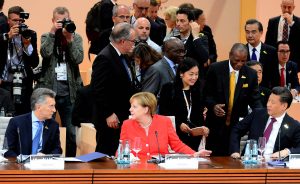On Wednesday, Germany’s Federal Foreign Office announced a set of Indo-Pacific policy guidelines, becoming the second European nation after France to formally adopt a strategy for the Indo-Pacific region.
According to a press release accompanying the announcement (the full 40-page guideline is yet to appear in English translation), the strategy is designed to allow Germany to make “an active contribution to shaping the international order in the Indo-Pacific.” As Foreign Minister Heiko Maas was quoted as saying in the press statement, the Indo-Pacific, “is where the shape of the international rules-based order of tomorrow will be decided. We want to help shape that order—so that it is based on rules and international cooperation, not on the law of the strong.”
Berlin’s Indo-Pacific guidelines foreground maritime security cooperation, human rights, and the diversification of Germany’s economic partnerships in the Indo-Pacific in order for it and regional partners to “to avoid unilateral dependencies.”
On one level, the strategy is a simple concession to economic and geopolitical reality. Asia has long been Germany’s largest export market outside of Europe itself, and its economy remains heavily reliant on the global supply chains and open sea lanes that speed German-made cars and other goods to fast-growing Asian markets. It recognizes that the growing strategic uncertainty in the Indo-Pacific—due both to China’s increasing assertiveness in the region and the American push back that this has engendered—is likely to have direct impact on Germany’s future prosperity and security. Conversely, improved partnerships with other nations in the Indo-Pacific will undoubtedly help Germany handle many of the global challenges posed by an increasingly brash and ambitious China.
Particularly notable, according to one leading expert, is the context and timing of the German announcement. On July 1, Germany assumed the EU Council’s six-monthly rotating presidency, putting it in a position to shape the bloc’s approach to the Indo-Pacific throughout the remainder of its term. The announcement also follows a five-nation European tour by Chinese Foreign Minister Wang Yi, which, as Eleanor Albert noted in The Diplomat this week, was intended to shore up ailing Chinese partnerships in the region. His colleague Yang Jiechi, the head of the Chinese Communist Party’s Central Foreign Affairs Commission, is also visiting Spain and Greece this week.
The German push punctuates the growing mood of distemper toward China throughout Europe, stemming from Beijing’s recent crackdown in Hong Kong, its harsh treatment of the Uyghurs in the Xinjiang region of western China, and the increasingly coercive methods it has used to quell opposition to Chinese policies. The full-bore diplomatic and state media assault that greeted this week’s visit to Taiwan of Czechia’s Senate President Milos Vystrčil, whom the CCP’s tabloid mouthpiece Global Times denounced as a “political hooligan” who was “trampling on diplomatic civilization,” is likely to undermine China’s attempts at European damage control. As French President Emanuel Macron declared during a European Council meeting in March last year, “the time of European naiveté [towards China] is over.”
At the same time, Germany’s engagement with the Indo-Pacific is likely to differ considerably from the go-it-alone posture of the United States under President Donald Trump, which has also put the Indo-Pacific at the center of its national security strategy. While the German guidelines hold out a diversification of economic and trade links away from China, preexisting trade flows militate against any significant economic decoupling. According to one report from February, China accounts for four out of every 10 Volkswagen cars sold worldwide and almost three out of every 10 vehicles sold by BMW and Mercedes-Benz. Berlin will want to maintain this important trade relationship.
Moreover, an important part of its approach to the region will be “to strengthen structures of international cooperation”—exactly the sort of multilateral mechanisms that the Trump administration disdains. For example, the German announcement singled out the ten-member Association of Southeast Asian Nations (ASEAN) as a special focus of engagement. Indeed, one could read Berlin’s opposition to “the law of the strong” as a veiled declaration of independence from Washington’s “America First” unilateralism.
Whatever its differences with Washington, however, the German announcement unmistakably signals Europe’s growing reassessment of its approach to China. It won’t be long before other European nations follow Germany and France in forging new paths into the Indo-Pacific.

































